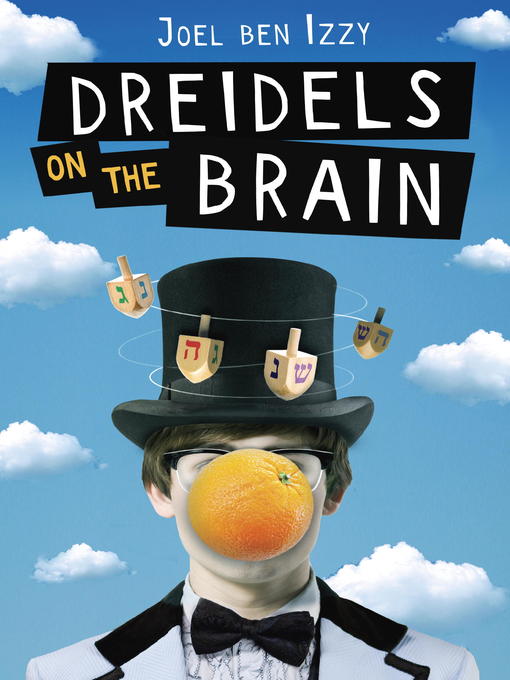
Dreidels on the Brain
فرمت کتاب
ebook
تاریخ انتشار
2016
Lexile Score
790
Reading Level
3-4
ATOS
5
Interest Level
4-8(MG)
نویسنده
Joel ben Izzyشابک
9780698141667
کتاب های مرتبط
- اطلاعات
- نقد و بررسی
- دیدگاه کاربران
نقد و بررسی

August 22, 2016
It’s 1971, and 12-year-old Joel, seeking a Hanukkah miracle, begins a conversation with God that spans the eight-day holiday. A number of things weigh heavily on Joel: being the only Jewish family at his California private school, his father’s poor health, the family’s money struggles, and Joel’s crush on Amy, an old friend who helps out with the magic shows he performs. Things get more complicated when Joel’s father falls into a coma, and Joel and his family are asked to teach his school about Hanukkah, something Joel dreads. Joel tries to find meaning amid the chaos, and a seemingly random interaction on a bus proves to be the miracle he was seeking. In a story loosely inspired by his upbringing, ben Izzy (The Beggar King and the Secret of Happiness) shares warm, humorous musings on and explanations of Jewish culture (“Nobody can agree on the rules, which is how you know it’s a Jewish game,” he says of spinning the dreidel), though these can sometimes overshadow the scant plot. A meandering but moving coming-of-age journey. Ages 10–up.

Joel is hoping for a miracle. Actually, the white Jewish boy is hoping for several.He wishes his family could pay its bills rather than buying time by "accidentally" sending the telephone check to the water company. He wishes his father's hands weren't so gnarled by arthritis that it's a struggle to pick up small objects. And he wishes no one knew his last name (which is too embarrassing to repeat here). Joel and his family are practically the only Jews in town, which makes him very nervous about the "Winter Holiday Assembly," where they're supposed to light the menorah in front of everyone. He suspects that--barring a miracle--the event will lead to further humiliation. (The events, sadly, are based on the author's childhood in the 1970s.) Ben Izzy rarely mentions the race of the characters, though inferences can be made from their names. (Joel's crush is named Amy O'Shea.) But the other characters are barely present. For chapters at a time, the only character is Joel, telling readers lengthy stories and shaggy dog jokes. He's so entertaining that some people won't notice when the plot stalls for pages on end, as plot is not the book's strength. When the assembly turns into a train wreck, the scene is so over-the-top it hardly makes sense. Plot, schmot. Readers may be so charmed by Joel that they forgive the book's flaws and wish him a miracle. (Historical fiction. 10-15) COPYRIGHT(1) Kirkus Reviews, ALL RIGHTS RESERVED.

November 1, 2016
Gr 4-7-The year is 1971. Joel is a dorky 12-year-old amateur magician from one of the few Jewish families in town. He's dealing with his parents' poverty, his dad's crippling arthritis and temporary coma, and with being asked to teach his whole school about Hanukkah at the Winter Holiday Assembly. Joel's talents as a jokester and his ever-ready magic tricks get him through his daily difficulties. Even the dreaded assembly is a success because of Joel's storytelling chutzpah and his family's willingness to embrace their own weirdness. The author is a professional storyteller who has based this book loosely on his own childhood. Young Joel's first-person narration addresses the audience directly, self-consciously mocking and explaining Jewish customs and history. Joel often sounds like an adult looking back at 1971 rather than a child living it, especially when he is touched by the Holocaust memories of a stranger on a bus. His level of Yiddishkeit ("Man-O-Manischewitz!") seems extreme for an assimilated child, giving the impression of a young Billy Crystal rather than a real kid. That said, he is a sympathetic character, and his jokes are (mostly) funny. While the plot meanders a bit, the ride is entertaining. The satisfying conclusion allows Joel to feel pride in his family, to triumph in front of his friends, and to get the (non-Jewish) girl. VERDICT An entertaining, slightly over-the-top slice of Jewish suburban life in the 1970s, with the bonus of magic tricks and jokes. Give to readers who like realistic, character-driven stories.-Heidi Rabinowitz, Congregation B'nai Israel, Boca Raton, FL
Copyright 2016 School Library Journal, LLC Used with permission.

November 15, 2016
Grades 4-7 The year 1971 is near its end, and Joelmiddle-schooler, amateur magician, and youngest of three brothersdoesn't have high hopes for Hanukkah this year. Joel and his brothers have never really gotten presents, as both their parents have medical issues that keep finances tight. Plus, Joel's one of the only Jewish kids at his school in an L.A. suburb, so everything is Christmas-themed anyway. Joel's not even sure how much of his religion he believes, so he decides to use the eight days of Hanukkah to ask God for a little proof. With his father's illness worsening and a humiliating school assembly looming, what else can Joel do but wish for a miracle? The plot, madcap to begin with, sometimes veers entirely off the rails, but Joel's witty, tongue-in-cheek narration will keep readers turning the pages. Loosely autobiographical and packed with anecdotes about Jewish culture and Hanukkah history, this never-didactic tale is a welcome addition to the canon of holiday stories.(Reprinted with permission of Booklist, copyright 2016, American Library Association.)

























دیدگاه کاربران